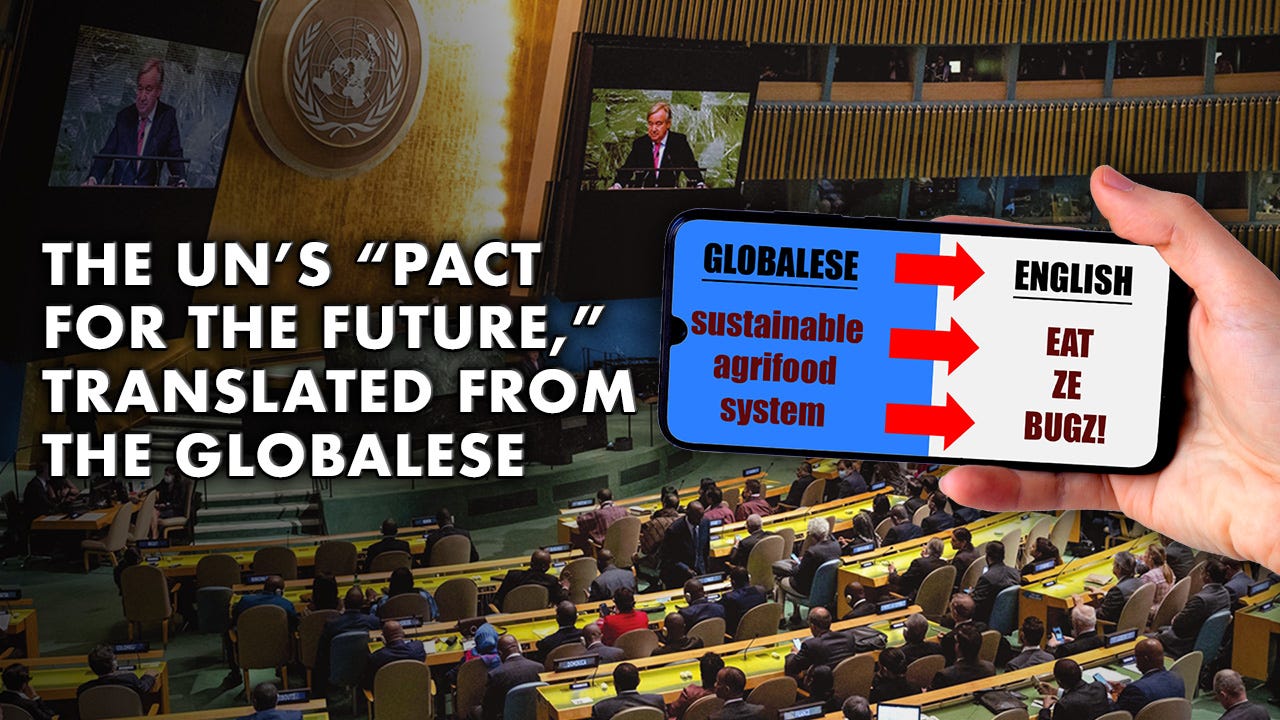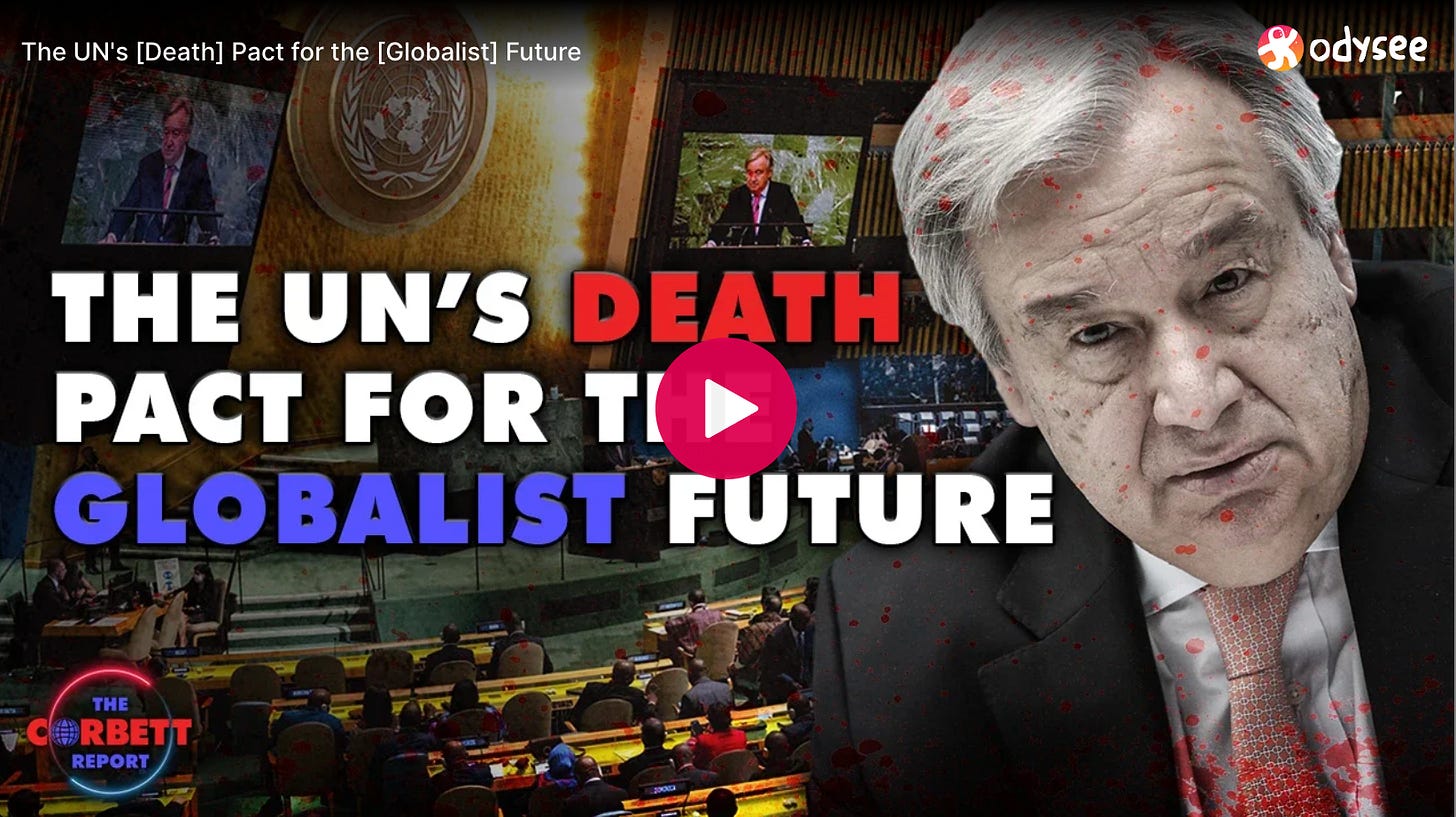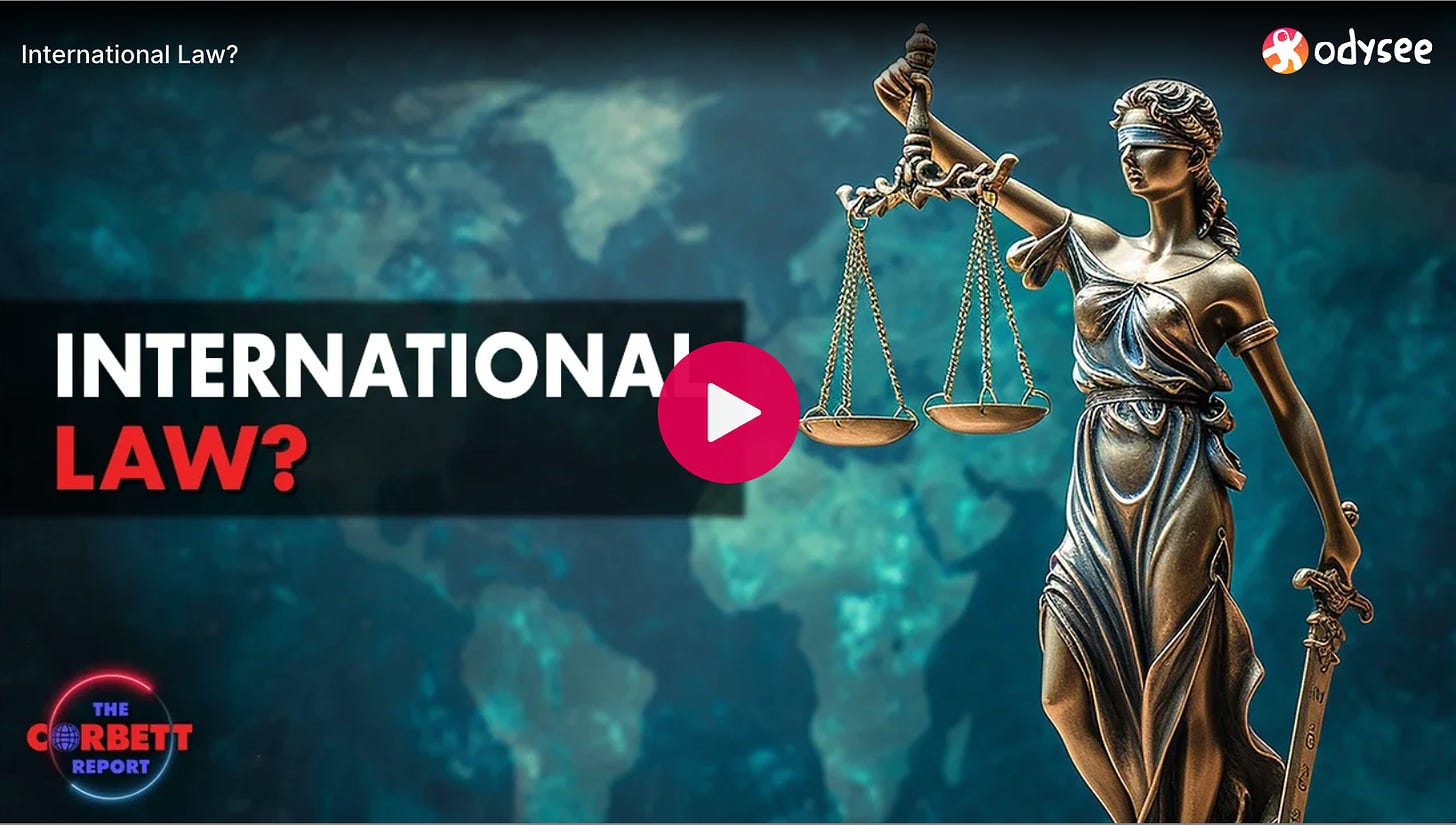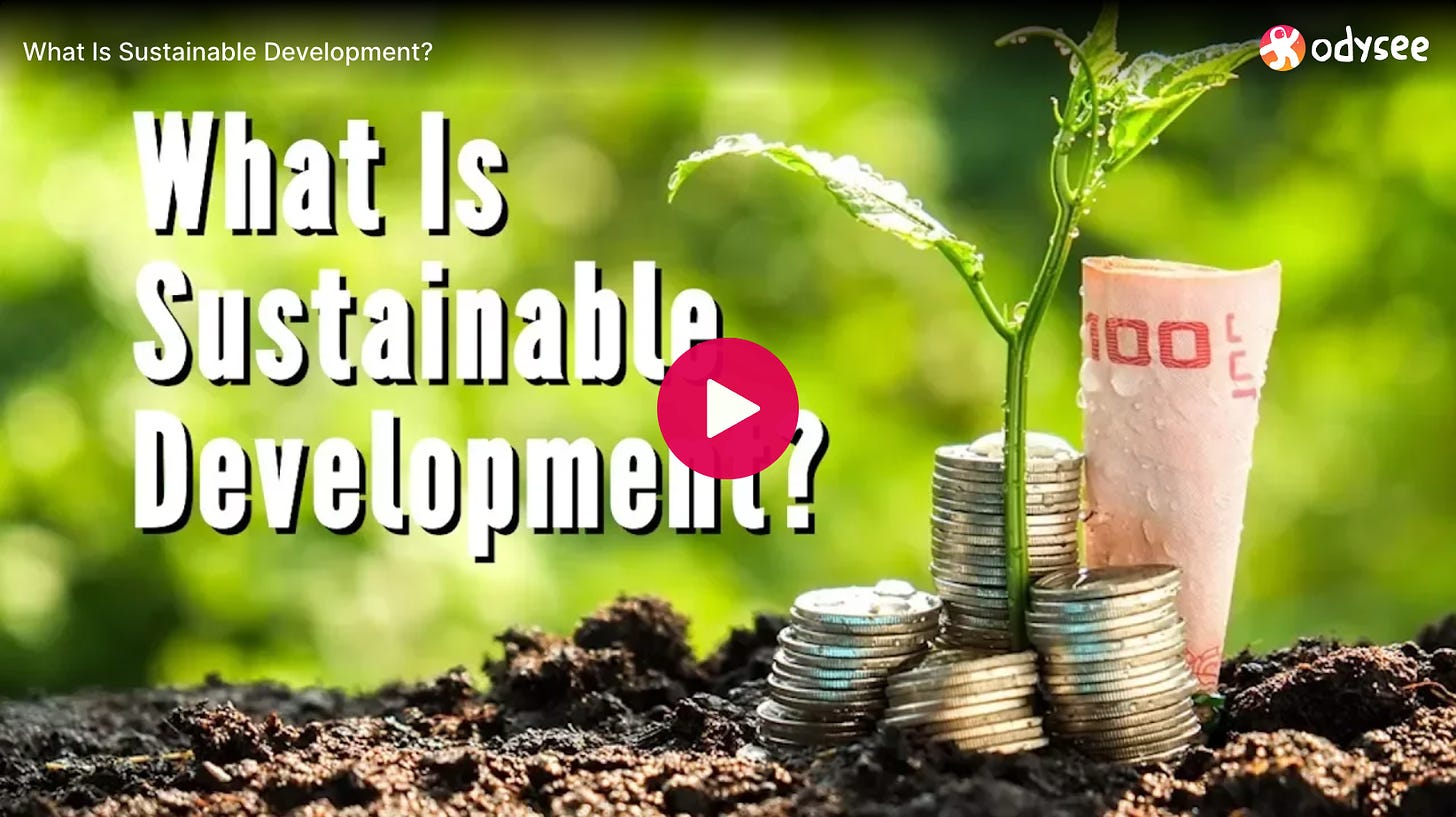
Sep 22, 2024

by James Corbett
corbettreport.com
September 22, 2024
Have you ever heard an establishment mouthpiece, a political puppet or a globalist gopher say something like: “Out of these troubled times, our fifth objective—a new world order—can emerge. A new era, freer from the threat of terror, stronger in the pursuit of justice, and more secure in the quest for peace”?
Or: “As our world becomes more complex, more uncertain, and more dangerous, we have an even greater responsibility to strengthen the multilateral system”?
Or: “The constructive contributions by INB relevant stakeholders were incredibly valuable. Together, we must sustain this progress during the coming months to realize our shared goal to forge a pandemic agreement that guides future global responses to pandemics”?
Yes, those are English words coming out of their mouths. But they’re not speaking English. They’re speaking Globalese.
You see, Globalese sounds like English and it employs English words, but it has its own dictionary, in which certain words have a completely different meaning. If you think you can understand terms like “sustainable development” or “international law” by looking them up in your standard English dictionary (or, even worse, Wikipedia), you’re sadly mistaken.
Thankfully, after decades of listening to these globalists speak, I have a fairly good grasp of Globalese. Today I offer my services to help you translate the Globalese gobbledygook in the United Nation’s new “Pact for the Future” into plain English.
Sorry, and you’re welcome!
The Corbett Report is a reader-supported publication. To receive new posts and support my work, consider becoming a free or paid subscriber.
Decoding the [Death] Pact
If you have no idea what the Pact for the Future is, the first thing you’re going to need to do is to watch my recent podcast on the subject: Episode 465 – The UN’s [Death] Pact for the [Globalist] Future.

There, you’ll not only discover what the Pact for the Future actually is—an international agreement that is set to be adopted by the United Nations member states right before this week’s General Assembly convenes in New York—but you’ll also find a link to the latest revision of the document. (That’s right, just like the WHO’s proposed pandemic treaty earlier this year, the kakistocrats are working on this globalist death pact right up to the last minute!)
And now that you’re up to speed, it’s time to dive into the document itself.
First, let me show you how this works. Here are the opening words from Article 1 of the latest revision, presumably setting the tone for the rest of the pact:

This is a fascinating passage, because it really does tip the hand of these conspiratorial kleptocrats. We could compare it to the language of the schemers who convened in Philadelphia in 1787 to betray the Declaration of Independence and to co-opt the American Revolution by drafting a constitution for the United States. When those constitutional conspirators actually put pen to paper, they at least had the sense to begin the preamble to their document with a sop to those who fought in the War for Independence: “We the people of the United States . . .”
Of course, this was a cynical piece of rhetorical manipulation on the part of the so-called “Founding Fathers.” It was not “We the people” drafting the US Constitution, after all, but a cabal of conspirators who met under the guise of revising the Articles of Confederation. Such was the public’s ignorance of what was being agreed to under their name that we have the famous (and likely apocryphal) story of Eliza Powel asking Benjamin Franklin as the convention adjourned: “Well, Doctor, what have we got: a republic or a monarchy?” To which Franklin supposedly replied: “A republic, if you can keep it.” (Let’s not even get into the question of how that constitution of “We the people” was ratified.)
But the UN conspirators need no such pretense. They simply assert that they—the “Heads of State and Government”—represent the peoples of the world and have appointed themselves the task of determining how best to “protect the needs and interests” of not only all humans living on the planet, but all those humans who will ever be born in the future.
That this gaggle of globalists would have such ambitions should not be surprising. But that they would reveal their lust for power so blatantly, in black and white, is downright shocking. It is a testament to their incredible hubris and is thus, perhaps, the most fitting way they could begin a document such as this.
So, where do we go from here? Why, Article 2, of course!

Those not versed in Globalese will doubtless read this passage without batting an eyelash. Yes, the world is facing “catastrophic and existential risks” and a “profound global transformation” is necessary to avert “a future of persistent crisis and breakdown.” We can see that for ourselves by simply scanning the news headlines every day.
But those who are fluent in Globalese will doubtless spot the caveat cleverly inserted at the end: this crisis is “caused by the choices we make.” Who is this “we,” exactly? And which choices are causing existential risks to humanity, precisely? The implication, of course, is that you and I are responsible for this mess, that our actions—our daily drive to work or our use of air conditioning or our meat-eating habit—are threatening the future of the planet.
If this sounds like a calculated attempt by the very persons who are actually causing the world’s problems—the mis-leaders heading up the war machine and the climate scam and the surveillance state and the financial system—to deflect the blame for their actions on to the masses they are supposedly “representing,” that’s because it is. In fact, the globalists have admitted in the past that they employ this very tactic of framing problems as problems “caused by man” so that they can then declare humanity itself to be their enemy.
Don’t believe me? Read this passage from The First Global Revolution, a 1991 book from The Club of Rome purporting to identify, diagnose and solve the world’s problems:
In searching for a new enemy to unite us, we suggested that pollution, the threat of global warming, water shortages, famine and the like would fit the bill. In their totality and in their interactions, these phenomena constitute a common threat which demands the solidarity of all peoples. But in designating them as the enemy, we fall into the trap. about which we have already warned, namely mistaking symptoms for causes. All these dangers are caused by human intervention and it is only through changed attitudes and behaviour that they can be overcome. The real enemy then is humanity itself.
By blaming us for the world crisis, these self-appointed “representatives” of humanity are thereby claiming that they are empowered to regulate, limit, restrict and otherwise control our activities in the pursuit of their self-appointed mandate of solving the world’s existential crisis. And in that formulation, we are their enemy.
On to Article 3:

In this passage, we should of course read “hope” as “hopium.”
“Global transformation,” meanwhile, is a particularly resonant phrase for the global elitists. The concept of a global revolution or transformation is important to these would-be rulers of humanity. Indeed, their dream of a New World Order is always framed as the end goal of a global revolution or transformation (think Klaus Schwab’s “Fourth Industrial Revolution” or The Club of Rome’s aforementioned First Global Revolution). “Global transformation” also brings to mind the Project for a New American Century’s “Rebuilding America’s Defenses” document from September 2000, in which the neocon authors warned that the “process of transformation” of the American military “is likely to be a long one, absent some catastrophic and catalyzing event—like a new Pearl Harbor.”
But perhaps the most interesting phrase in Article 3 is “our common humanity.” It’s obviously a strange thing to say in regular English. Yet an appeal to “our common humanity” is exactly the type of Globalese term these cold-blooded-psychopaths-masquerading-as-regular-people would employ to get us on board with their anti-human agenda. “Hello, fellow Hu-mons! Let us contemplate our common humanity. Don’t mind the cattle prod in my hand!”
More seriously, the phrase evokes the “Our Common Agenda” document that UN Secretary General Antonio Guterres unleashed on the world in 2021 in response to a resolution that the UN member states passed on the occasion of the UN’s seventy-fifth anniversary in September 2020. That resolution “request[ed] the Secretary-General to report back before the end of the seventy-fifth session of the General Assembly with recommendations to advance our common agenda and to respond to current and future challenges.” (If you follow the link back to the resolution you’ll find a skillfully deployed “We the peoples” embedded in Article 21!)
As Corbett Report viewers will know from my conversation with Dr. Jacob Nordangård last year, Guterres’ resulting report kickstarted a process that led to the creation of a series of “Our Common Agenda Policy Briefings,” which in turn informed the creation of this Pact for the Future. Those policy documents included briefings on the creation of a “Global Digital Compact” (i.e., Orwellian surveillance and control of the internet); “Reforms to the International Financial Architecture” (i.e., a global tax grid and global economic governance); “For All Humanity – the Future of Outer Space Governance” (because the earth is not big enough for these greedy globalists); and “An Emergency Platform” (i.e., the authority for the UN Secretary General to assume extraordinary powers of coordination and control in the event of the next declared global emergency).
Keep in mind, when a globalist uses the phrase “Our Common Humanity,” he is just using it to sell you on his own power-grabbing agenda.
OK, you get the idea. I’m not going to go through every single article of this pact, because we’d be here all day. But let me help you with some of the more misleading or obscure Globalese phrases in the document.
“International Law”
There are many uses of the phrase “international law” in the pact. For example, Article 5 informs us that overcoming the problems we face “will require a recommitment to international cooperation based on respect for international law.” The term “international law” is designed to sound good to an English speaker’s ear. After all, who doesn’t want law and order?
However, the globalists’ “international law” refers not to an ideal of universal justice, but to a world ruled over by a singular, unaccountable world court in the manner of the Nuremberg trials—i.e., victor’s justice. If you want to see what “international law” actually looks like, you need look no further than the International Criminal Court, a joke of an institution that has spent almost the entirety of its existence prosecuting African kleptocrats and studiously ignoring the actions of some of the biggest war criminals in the history of the world.
For a deeper understanding of what the Globalese term “international law” means in plain English, please see my 2013 podcast on the subject.

“Sustainable Development”
“Sustainable development” is not just one of the most-used phrases in the Pact for the Future, it is also—as Article 9 of the pact helpfully tells us—one of the “three pillars of the United Nations” (the other two being “peace and security” and “human rights”).
On its face, “sustainable development” is a straightforward English phrase. As the bastion of truthiness puts it: “Sustainable development is an approach to growth and human development that aims to meet the needs of the present without compromising the ability of future generations to meet their own needs.” But a clue to the phrase’s meaning in Globalese is provided later in the same Wikipedia article, where it is noted “The Brundtland Report in 1987 helped to make the concept of sustainable development better known.”
For those not in the know, “The Brundtland Report” refers to the final report of a UN commission chaired by Norwegian Prime Minister Gro Harlem Brundtland from 1983 to 1987. This report—titled (you guessed it!) “Our Common Future“—peddled the same anti-human narrative that The Club of Rome and seemingly every other globalist organization love to parrot. You’ve heard their mantra by now: the world is too polluted, the “human environment” is deteriorating, you and your family are to blame, and we must cede power to the United Nations so they can “sustainably develop” the world’s dwindling resources.
Of course, this narrative is debunked pseudoscientific hogwash of the worst kind. Nevertheless, it appeals to the indoctrinated masses, steeped as they are in the Malthusian propaganda of the globalist institutions.
In reality, “sustainable development” has nothing to do with saving Mother Earth. Instead, it’s a cynical ploy designed to enable the greatest heist in the history of the planet—the monopolization of the earth and all of its resources (including human resources). And, judging from how often “sustainable development” is promoted as a noble goal by politicians, governments and international organizations these days, it seems to be working.
If you want to find out what “sustainable development” really means, you should consult my 2017 podcast on the subject.

“New Collective Quantified Goal“
Article 28 (c) of the pact makes reference to a “new collective quantified goal,” or NCQG.

“COP 29,” as my regular readers already know, refers to the 29th “Conference of the Parties,” the annual meeting of the member states that are party to the U.N. Framework Convention on Climate Change (UNFCCC).
For those not keeping track at home, COP 29 will take place this November in Azerbaijan, where a new collective quantified goal for climate finance is due to be adopted. According to the UNFCCC itself, the NCQG “is a new global climate finance goal that the Conference of the Parties serving as the meeting of the Parties to the Paris Agreement (CMA) shall set from a floor of USD 100 billion per year, prior to 2025.”
And what, exactly, will this $100 billy+ in annual funding actually finance? Bring on the Globalese:
In 2021, Parties agreed the aim of the NCQG as to contributing to accelerating the achievement of Article 2 of the Paris Agreement of holding the increase in the global average temperature to well below 2 °C above pre-industrial levels and pursuing efforts to limit the temperature increase to 1.5 °C above pre-industrial levels, recognizing that this would significantly reduce the risks and impacts of climate change; increasing the ability to adapt to the adverse impacts of climate change and foster climate resilience and low greenhouse gas emission development in a manner that does not threaten food production; and making finance flows consistent with a pathway towards low greenhouse gas emission and climate-resilient development.
In plain English: the NCQG is a trough of funds set aside to buy off corrupt kakistocrats in developing countries so that we don’t see a repeat of COP 15. After all, there are tens of trillions of dollars in investable capital on the table for this green swindle, and if the powers of international finance can bribe some Third World leaders with a $100 billion a year, they’ll gladly do so.
“Complex global shocks“
Action 56 in the pact reads:

“Complex global shocks” is an allusion to the globalists’ new favourite neologism: polycrisis.
In Globalese, a “polycrisis” refers to neither a single emergency, nor the combined effects of a group of individual emergencies. Instead, it refers to the way one emergency can combine with and exacerbate another emergency, resulting in a poly-crisis that is worse than the sum of its uni-crisis parts.
As I explained in “Here’s Why the World is Falling Apart (and What You Can Do About It!),” this word has been in vogue among the global jet-setters of late. First coined by French post-Marxist sociologist Edgar Morin decades ago, the term was picked up and used by former European Commission president (and longtime Bilderberg stalwart) Jean-Claude Juncker in a 2016 speech reflecting on the challenges facing the European Union.
This European Union has faced its worst economic, financial and social crisis since World War II. And it is still struggling with the consequences. I have often used the Greek word ‘polycrisis’ to describe the current situation. Our various challenges—from the security threats in our neighbourhood and at home, to the refugee crisis, and to the UK referendum—have not only arrived at the same time. They also feed each other, creating a sense of doubt and uncertainty in the minds of our people.
The word was then picked up and elaborated by mainstream historian (and Davos attendee) Adam Tooze in the Financial Times before becoming the “buzzword” at Davos in 2023.
It’s not difficult to understand why the concept of a “polycrisis” (or, as the pact calls it, “complex global shocks”) appeals to the globalists at Davos and the UN and elsewhere. A crisis that interacts with and amplifies other crises quickly becomes so confusing and overwhelming a problem that it can only be sorted out by “experts” who have the appropriate globalist credentials. You know, technocrats.
This is exactly the way that the UN conspirators frame it in the Pact for the Future: “Complex global shocks are events that have severely disruptive and adverse consequences for a significant proportion of countries and the global population, and that lead to impacts across multiple sectors, requiring a multidimensional, and whole-of-government, whole-of-society response.”
In other words, the problem is complex, but the answer is simple: global government!
THE BOTTOM LINE
I could go on, but you get the idea by now. The globalists are using English words, but they are speaking Globalese. When you learn to speak their language, you begin to recognize that all their feelgood rhetoric about ending poverty and achieving world peace is not actually about “ending poverty” or “achieving world peace,” but about creating a global government to steward over a neofeudal system of complete economic and societal control.
Here’s a test to see if you’re getting the hang of this yet. Action 3 of the pact is the pledge: “We will end hunger, eliminate food insecurity and all forms of malnutrition.” This is to be achieved by (among other things) “promot[ing] equitable, resilient, inclusive and sustainable agrifood systems so that everyone has access to safe, affordable, sufficient and nutritious food.”
Using your knowledge of Globalese, can you explain what “equitable, resilient, inclusive and sustainable agrifood systems” means in English? (Leave your answer in the comment section of this post on CorbettReport.com!)
But now that we’ve got the hang of this, here’s the bottom line: The globalists are playing a game with humanity. They pretend to speak to us in our language, but they are really getting us to buy into their agenda. An agenda of domination and control. An agenda of destruction and impoverishment. An anti-human agenda dedicated to the creation of an unaccountable one world government headed by the globalist technocrats and their cronies for the benefit of themselves.
So, let me respond to them in plain English:
You do not represent me. I do not consent to your plans. I do not cede my authority as a sovereign individual to the UN or to any other body to make decisions for me and my family. I do not participate in your systems of control, and nothing you say, no compact you make, no treaty you sign, has any relevance to me. I am a free human being, and I make my own choices in life in cooperation with others in my community as I see fit.
I would translate that message into Globalese so the globalists can understand me better, but I don’t think these words exist in their language. Somehow, I think they’ll get the message anyway.
Like this type of essay? Then you’ll love The Corbett Report Subscriber newsletter, which contains my weekly editorial as well as recommended reading, viewing and listening. If you’re a Corbett Report member, you can sign in to corbettreport.com and read the newsletter today.
Not a member yet? Sign up today to access the newsletter and support this work.
Subscribe to The Corbett Report
Thousands of paid subscribers
James Corbett writes about politics and society from an independent perspective
Leave a Reply